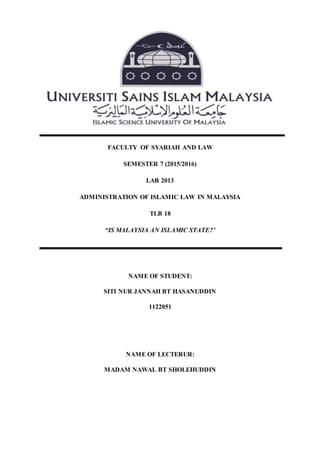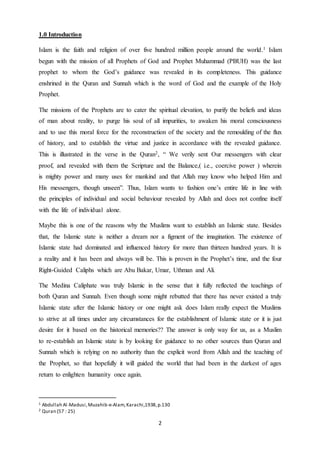This document discusses whether Malaysia can be considered an Islamic state. It begins by providing background on Islam and the concept of an Islamic state. It then defines key terms like "state" and discusses perspectives on the state from Western and Islamic sources. The document notes there are differing views on what constitutes an Islamic state, but it generally refers to a ruling authority that implements Sharia law. It also explains Islamic constitutional law is based on Quran, Hadith and consensus of scholars. While Malaysia has Muslim majority, it may not fully qualify as an Islamic state since it does not apply all Islamic provisions in its constitution. The question of what form an Islamic state should take remains open to debate.












![13
cases where the said argument was presented before the courts23. The learned judge in the
landmark case, Che Omar24, concluded that the real intention of these constitution framers
was Islamic law was to be understood in an isolated manner, confined just to the law of
marriage, divorce and inheritance only. He put the responsibility of relegating the scope of
Islam, i.e. Islamic law to the British colonialists following their rule of the land.
According to Professor Sheridan, the Supreme Court decision in the Che Omar, was
doubtless correct, where he stated that “A Federation, as opposed to the people within its
territory, having a religion is a difficult notion to grasp. It has been suggested that the
probable meaning of the first part of Article 3(1) is that, insofar as federal business (such as
ceremonial business) involves religious matters that business is to be regulated in
accordance with the religion of Islam.”25 This shows that the meaning of Islam in the frames
of constitution had been given a narrow interpretation where Islam is only relates to rituals
and ceremony26 nevertheless it is recognise as the law of the land.
Besides that, Malaysia does not enforce some of the mandates which stipulated in the divine
law such as Hudud, in curbing the criminal cases. Hudud provides much required peace and
security as crimes would be reduced to its minimum27. The Holy Quran, Al-Maaidah: 38,
stated to the effect that “As to the thief, male or female, Cut off his or her hands: punishment
by way Of example, from Allah. For their crime: And Allah is exalted in Power, Full of
Wisdom”. As a person professing Islam, it is mandatory upon the believers to comply with
what had been instructed to the believers in the divine law and it must be implemented. Those
who votes for hudud will claim that, "Malaysia is an Islamic country, therefore, we should
have Islamic laws" while those who against hudud claimed that “Malaysia is a secular
country and Islamic law has no place in it"28. Instead, Malaysia implements the Penal Code
(Act 574) which is originated from Indian Penal Code in administrating the criminal law.
It is contended that Hudud penalties violate the human rights29. There are several types of
punishments stated in the Hudud laws. One of the punishments is the punishment for Sariqah
(theft) is amputation of hand or cross amputation of limbs. It is allege that Hudud penalties
are disproportionate for the crime committed. Implementation of punishments that includes
different form of cruel, inhuman and degrading treatment imposed on the offenders violates
the human rights. The nature of Hudud penalties is out dated and inhuman. It does not fit in
the country with multiracial and multi religion society. Hence, this is one of the reasons why
the non-Muslim rejected and opposed firmly Islamic state which they fear that the divine law
will be implemented.
23 Hajjah Halimatussaadiah binti Haji Kamaruddin v.Public Services Commission Malaysia& Anor., [1994] 3
C.L.J. 532; Meor Atiqulrahman bin Ishak & Ors v. Fatimah bte Sihi & Ors,[2000] 5 M.L.J. 375; Fatimah Sihi v.
Meor Atiqulrahman bin Ishak,[2005] 2 M.L.J. 25.
24 Che Omar bin Che Soh v. Public Prosecutor,[1988] 2 M.L.J. 55
25 Thomas, T. (2005,November 17). Is MalaysiaAn IslamicState?
26 Wan Ahmad, D. (n.d.). Historical Legal Perspective.
27 The Islamic Partof Malaysia(PAS),The Islamic State Document, p19
28
Wu, J. (2014, May 18). Is Malaysiaan Islamic country? Retrieved from
http://www.themalaysianinsider.com/sideviews/article/is-malaysia-an-islamic-country-josh-wu
29 Meng, T. (2014,May 6). Pas And Hudud Law In Malysia:APositiveOr Peril?](https://image.slidesharecdn.com/mlaysiaisanislamicstate-160108124749/85/Mlaysia-is-an-islamic-state-13-320.jpg)
![14
Apart from that, Malaysia applied democracy concept. The main difference between an
Islamic state and democracy state lies in the ultimate or sovereign authority which inherent in
the will of the people. Although, the people remain the main sources of authority in an
Islamic polity, the basic structure of values in Muslim society is determined by reference to
divine revelation. But within that framework, the community is the locus of considerable
authority. It is the ummah, as stated earlier, whose authority the government represents. The
government is accountable to it and the ummah is entitled to depose a leader who is in serious
violation of the terms of his office30. One might also argue that the Islamic state has features
in common with democracy and it is, in many ways. It is committed to the democratic ideals
of justice, equality and the basic liberties of the individual. Separation of powers which is a
pillar of Western democracy is also upheld in the Islamic state31.
For example in the jurisdiction matters32, the Administration of Islamic Law Act and parallel
state-level enactments establish a hierarchy in the shariah court judiciary akin to the
institutional structure that one would find in common law and civil law systems. Articles 40
through 57 of the Act, establish Shariah Subordinate Courts, a Shariah High Court and a
Shariah Appeal Court. While the concept of appeal is not completely alien to the Islamic
legal tradition, there is little or no precedent for the hierarchical structure of the shariah
judiciary from within the Islamic legal tradition.
It is important to note that there is a political logic to judicial hierarchy in the common law
tradition, upon which the shariah courts are modelled. Judicial hierarchy is designed to
achieve uniformity and ‘the downward flow of command’.
This is precisely the opposite dynamic of the concept in the Islamic legal tradition, where the
evolution of jurisprudence is bottom up and pluralistic, rather than a top-down and uniform. It
is not only the structure of the shariah court system that resembles the English common law
model. Procedural codes also follow suit33.
The process and that ‘‘methodology’’, if it can be so called, continue until today. The ex-
learned judge acknowledged that the similarity between the shariah criminal and civil
procedure are ‘to a large extent, the same as those used in the common law courts’. So much
so that ‘a graduate in law from any common law country reading the ‘‘Shari’ah’’ law of
procedure in Malaysia would find that he already knows at least 80% of them . . . a common
law lawyer reading them for the first time will find that he is reading something familiar,
section by section, even word for word. Yet they are ‘‘Islamic law’’’.
30 Kamali,H. (1993). Characteristics Of The IslamicState. Islamic Studies (Islamabad).
31 Kamali,H. (1993). Characteristics Of The IslamicState. Islamic Studies (Islamabad),p 33
32 Moustafa,T. (2013). Judging in God’s Name: State Power, Secularism,and the Politics of Islamiclawin
Malaysia.Oxford Journal of Law and Religion, Vol. 3,(No. 1 (2014)),Pp. 162, doi:10.1093/ojlr/rwt035
33 The Syariah Criminal ProcedureAct (1997) and the Syariah Civil ProcedureAct (1997) borrow extensively
from the framework of the civil courts in Malaysia.The draftingcommittee literally copied the codes of
procedure wholesale,making only minor changes where needed. When they are placed sideby side, one can
see the extraordinary similarity between the documents, with whole sections copied verbatim. Abdul Hamid
Mohamad, a legal official who eventually rose to be Chief Justiceof the Federal Court(as he then was),who
was on the draftingcommittees for the various federal and stateshariah procedures acts in the1980s and
1990s candidly described the codification of shariah procedureas follows:‘Wedecided to take the existing
laws that were currently in use in the common lawcourts as the basis to work on, remove or substitutethe
objectionableparts,add whatever needed to be added, make them Shari’ah-compliance[sic] and havethem
enacted as laws](https://image.slidesharecdn.com/mlaysiaisanislamicstate-160108124749/85/Mlaysia-is-an-islamic-state-14-320.jpg)


